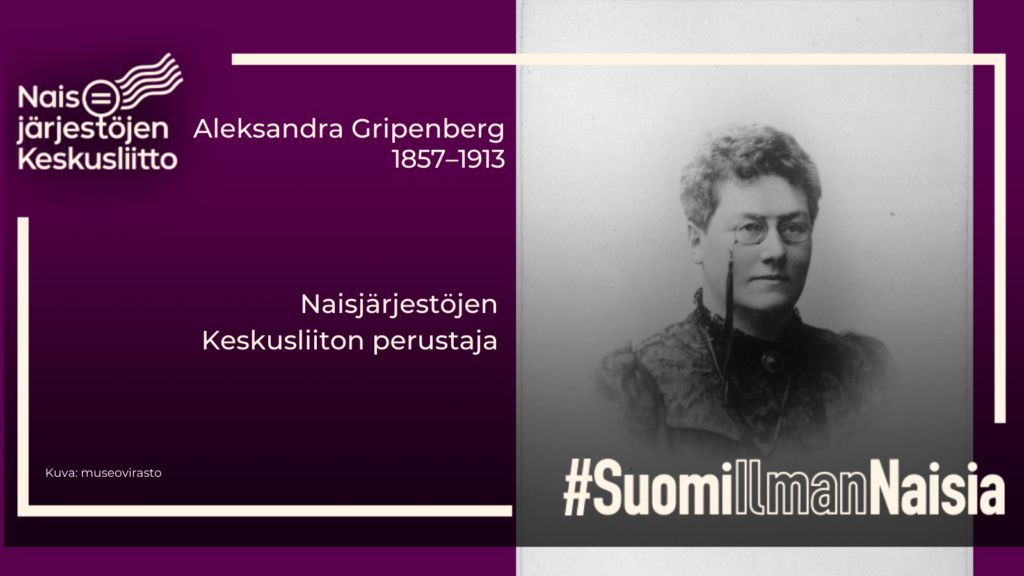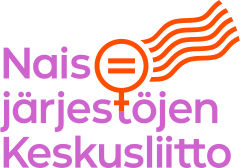The National Council of Women of Finland (originally the National Union of Women of Finland) was founded in 1911. The first president of the council was Aleksandra Gripenberg (1857-1913), a suffragette and a Member of Parliament.
There were 7 founder organisations: Koulukeittoyhdistys, Suomen Kasvatusopillinen talouskoulu, Suomen Käsityön Ystävät, Suomen Naisten Voimisteluliitto, Suomen Naisyhdistys, Naisliitto Hemmet and Maria-yhdistys.
These organisations operated in traditional fields. They promoted school lunches, home economic studies, crafting skills, women’s sports, morality, and the status of home. Only Suomen Naisyhdistys had an agenda promoting women’s emancipation.
Women wanted to make decisions independently, become free of guardianship, and share their opinions.
By the end of the 1930s, the National Union of Women of Finland became established as a forum for moderate women’s associations. They found it essential to influence legislation and to increase the number of women in committees and other governmental bodies. They also advanced women’s rights in marriage and employment, morality issues, and developing domestic advice.
Educated, linguistically skilled women wanted to work for the underprivileged and improve their own status in the society. Women wanted to make decisions independently, become free of guardianship, and share their opinions.
They also took a stance on general issues, such as language matters or politics during the period of oppression.

In 1947, the Union modernised their name to the National Council of Women of Finland, and their main course of action became activating women in politics. At the same time, the Council strives to remain politically neutral and to provide a central organisation open to all organisations. It is not an easy task, because most organisations have strong opinions regarding their priorities.
GRAND AND INDEPENDENT
Through its existence, the National Council of Women of Finland has been defined by fluidity: Some organisations have seized to exist, some have broken away only to rejoin the Council later. Of the seven founding organisations, only Suomen Naisyhdistys and Finnish Gymnastics Federation (SVoLi) have continuously remained members. Over the years, there have been a total of 115 member organisations.
In the 1980s, the Council was considered too far center-right to bring together all women across the political field. But the increased international co-operation required a joint forum for women, so in 1988 a new network, The Coalition of Finnish Women’s Associations (NYTKIS ry) was founded. The National Council of Women is an active member of NYTKIS. Today NYTKIS is also an important influencer in Finnish equality matters.
100+ YEARS OF WORK IN WOMEN’S ORGANISATIONS
Work done by non-governmental organisations is a fundamental standard of activity in a democratic society. Organisations offer a viewpoint into people’s lives, to hearing their thoughts and formulating them into operational models, often against an international background. Organisations provide guidance to becoming a social actor and influencer.
Women are involved in many large organisations but operating in a women’s organisation often has more leverage when promoting gender-specific matters. Women in public positions more often have a background in women’s organisations than non-governmental organisations of all genders. In the latter, men mostly populate representative positions.
Working in a women’s organisation is often more empowering for promoting gender-specific matters
The majority of work in women’s organisations consists of counselling and assisting services. Together we solve everyday problems as well as more wide-spread social issues. We have founded schools, libraries, children’s homes, daycare centers, and summer camps. We strive to influence legislation that improves the status of women and families.
IDEA GENERATORS AND TRAILBLAZERS
Most activities started by women’s organisations have evolved into welfare services maintained by the city or state. As social idea generators and trailblazers, women’s organisations have done the groundwork of social politics in the Finnish welfare state.
Women in organisations have worked extensively together with female members of parliament. The first female members of parliament promoted the same issues as the organisations: communal right to vote, allowing women to work in public positions and other industries, equal pay, expanding the rights of married women to align with other adults, improving the status of extramarital children, alcohol consumption issues, suspending prostitution, and charity issues.
Equality in the Finnish society is less a result of governmental or political approaches than it is of women’s activity and co-operation despite ignorance in the system. As indicated by equality polls, insisting on discussion on equality questions has resulted in citizens considering equality an important social issue.
STRENGHT THROUH INTERNATIONALITY
The National Council of Women of Finland was first founded as the Finnish branch of International Council of Women (ICW). Founded in Washington in 1888, ICW wanted to unite the two branches of women’s co-operation: the organisations promoting freedom and rights for women, and the ones focusing on charitable work.
ICW is a communication channel between women in different countries. They organised conferences for women to discuss issues concerning social and family welfare. Comparing the progress of women’s issues in different countries was a fundamental part of ICW’s actions.
Each member country submitted a progress report to the different committees in ICW. These reports were used to follow the progress of women’s rights, and they provided international arguments for promoting them domestically. The founder of the National Council of Women of Finland, suffragette Aleksandra Gripenberg, regularly participated in ICW meetings and drafted reports and publications to be used in Finland as well.
DECADE FOR WOMEN
ICW has been an active participant in the UN and its predecessor, League of Nations. In the 1960s, it was questioned whether ICW was still needed, but the then president of the National Council of Women of Finland, Helvi Sipilä, reignited the co-operation. At her initiative, ICW began collecting statistics of women’s status in different countries. Based on these statistics, in 1975 the UN organised a conference in Mexico, where they declared a 10-year international action programme for improving women’s status – the Decade for Women.
Equality in the Finnish society is less a result of governmental or political approaches than it is of women’s activity and co-operation despite ignorance in the system.
In 1979, following the conference in Mexico, the UN adopted the Convention on the Elimination of All Forms of Discrimination against Women (CEDAW). The convention kicked off the development of equality legislation in many countries. But Finland could not ratify the convention before fixing their national legislation.
UN conferences in Copenhagen in 1985 and Nairobi in 1990 were used to reflect on progress made on the convention. In 1995 in Beijing, the Beijing Platform of Action was adopted, and the progress made has been reviewed at conferences in New York in 2000, 2005 and 2010, as well as the Beijing Review and Appraisal Conference in 2005. NJKL has published shadow reports in 2000, 2005, 2010, 2015 and 2020.
ICW is just one forum for international co-operation. Most member organisations of NJKL work with their own partners to develop their expertise. Their common objective is well-being for women and safer global coexistence.
100 YEARS OF WOMEN’S LIVES AND ACTION
The National Council of Women of Finland was founded in 1911 to promote gender equality and women’s rights, and in 2011 we celebrated the Council’s centennial. In the year of celebration, the exhibition 100 Years of Women’s Lives and Action served as a reminder that the persistent work of women’s organisations has resulted in many societal changes, such as women’s voting rights and eligibility, securing the well-being of mothers and children, and expanding education and career opportunities for women.
